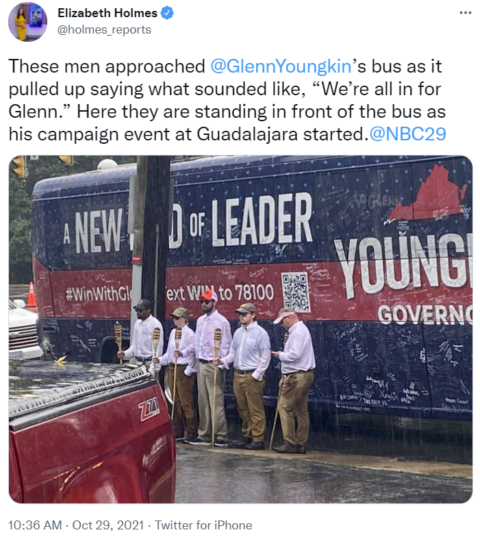British Army Documentaries
Published 21 Feb 2021Filmed in 1975, this documentary is set at Sandhurst, the officer training academy. It follows a group of young men preparing for a life of leadership in the Army. These “managers of violence” will be expected to perform to the very highest of traditions of the British Army and be prepared to apply their professionalism on British soil should the need arise.
© 1975
This production is for viewing purposes only and should not be reproduced without prior consent.
This film is part of a comprehensive collection of contemporary Military Training programmes and supporting documentation including scripts, storyboards and cue sheets.
All material is stored and archived. World War II and post-war material along with all original film material are held by the Imperial War Museum Film and Video Archive.
November 2, 2021
Sandhurst 1975 – The Royal Military Academy
Election day in Virginia
Mark Steyn writing about the Tuesday state elections being held in Virginia, which certainly seemed to become much more competitive as larger concerns about the school system energized a lot of parents, and a Republican-in-name-only group plays dirty tricks on the Republican candidate for governor:
Tuesday is what less evolved societies than Virginia still quaintly call “Election Day”. The Democrat candidate, the unlovely Clinton bagman Terry McAuliffe, claims that “we are substantially leading on the early vote”. In the fullness of time he will also be substantially leading on the late vote, if he isn’t already.
That leaves the votes on Voting Day up for grabs. The Republican candidate, Mr Youngkin, is a squish of no fixed beliefs who will govern as Mitt did in Massachusetts or Pataki did in New York. But he has been handed a winning issue that he would probably not have chosen save for public outrage — the state of Virginia schools in an age of “critical race theory” and trans-mania. It’s bigger even than an education issue: The left is so boundlessly ambitious that it is abolishing biological sex, and if it gets away with it will leave an awful mountain of human wreckage in its wake, bigger even than its other innovations.
Every Virginian should vote on Tuesday — because Youngkin’s campaign is a classic example of Milton Friedman’s dictum: in politics you don’t wait for the right people to do the right thing, you create the conditions whereby the wrong people are forced to do the right thing. That is what parents at school-board meetings have been doing, and they deserve to be rewarded for it.
Virginia is a state where a rapist gets transferred to another school because he/she belongs to a protected class, rapes again, and, when you protest the anal rape of your daughter by a known rapist, you’re the guy who gets thrown to the ground and arrested. Whether one finds the foregoing objectionable shouldn’t really be a Republican/Democrat thing, but such is the moral depravity of the cultural heights that Dems are all in on the convicted sodomizer and only squaresville low-status GOP candidates can muster even pro forma objections. So in 21st-century Virginia insouciance about schoolgirl anal rape is now a partisan thing.
Of course, it remains to be seen whether the state’s election system is sufficiently honest to reflect fairly that public outrage. If at, say, 10pm on Tuesday night Youngkin is narrowly ahead but you wake up on Wednesday morn to find McAuliffe has been the beneficiary of all the 3am votes, well, Republicans will be forgiven for suspecting that “fortifying” the “two-party system” into something rather more streamlined is here to stay.
I say that as an immigrant who never feels more foreign than on America’s hideously chaotic yet oddly purposeful election nights. But then in Northern Virginia a quarter of the population is now foreign-born, and half of those arrived in the last twenty years. That’s a remarkable statistic for a so-called “Old Dominion”. Demography is destiny, and in an ever more tightly circumscribed public discourse there are decreasing opportunities even to raise the topic.
How to Adjust the Depth of a No.4 Plane | Paul Sellers
Paul Sellers
Published 16 Jul 2021The depth adjustment could not be simpler once you have adjusted the lateral adjustment lever so that the blade cutting edge is parallel to the sole.
This adjustment determines the depth of cut for different thicknesses. I take this seriously when I make my adjustments and the more you practice, the more it will become second nature to you. This quick video will get you started and demystify this very efficient adjuster.
——————–
Want to learn more about woodworking?
Go to Woodworking Masterclasses for weekly project episodes: http://bit.ly/2JeH3a9
Go to Common Woodworking for step-by-step beginner guides and courses: http://bit.ly/35VQV2o
http://bit.ly/2BXmuei for Paul’s latest ventures on his blog
——————–
Instagram: http://bit.ly/2oWpy7W
Twitter: http://bit.ly/33S7RFa
Pinterest: http://bit.ly/35X5uTf
QotD: The foreign journalist’s best local source, the cabbie
It was often said that a journalist writing about a foreign country ought to stay either three days or three years: the former for strength of impression, or that latter for depth of knowledge.
I was a three-day man in that period of my life when newspapers would occasionally ask me to report on some revolution, civil war, social upheaval or other unusual event (I once went on a daytrip to India from Europe).
Given the circumstances, I gathered much of my information from the taxi-driver from the airport to the hotel where all the other journalists were staying. They did likewise, and in many an article, even in serious publications, a journalist has acted as a mere amanuensis for a taxi-driver.
I am far from decrying this genre of journalism: in my experience, taxi-drivers are exceptionally sensible and level-headed men, intelligent and well-informed but not educated, or rather not indoctrinated into believing the most obvious nonsense by having attended western-type establishments of supposedly higher learning.
Knowing that a journalist is a bird of passage, they did not fear, even in dictatorships, to speak the truth as they saw it: and generally they had seen a lot. With the advent of the mobile phone that hears everything and erases nothing, they may since have become more cautious. I don’t know: no one sends me anywhere these days.
Theodore Dalrymple, “On Taxi Cab Drivers, Barbers, and Learning the Truth”, The Iconoclast, 2021-06-21.






